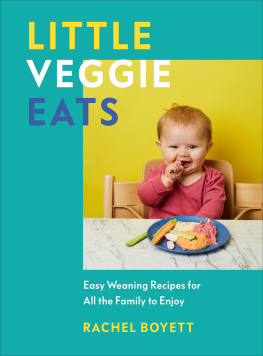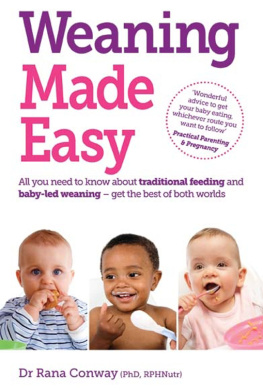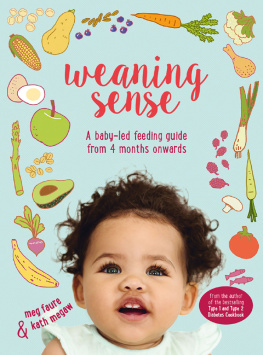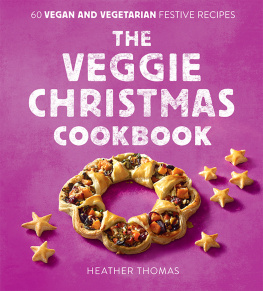Contents
Guide
Page List
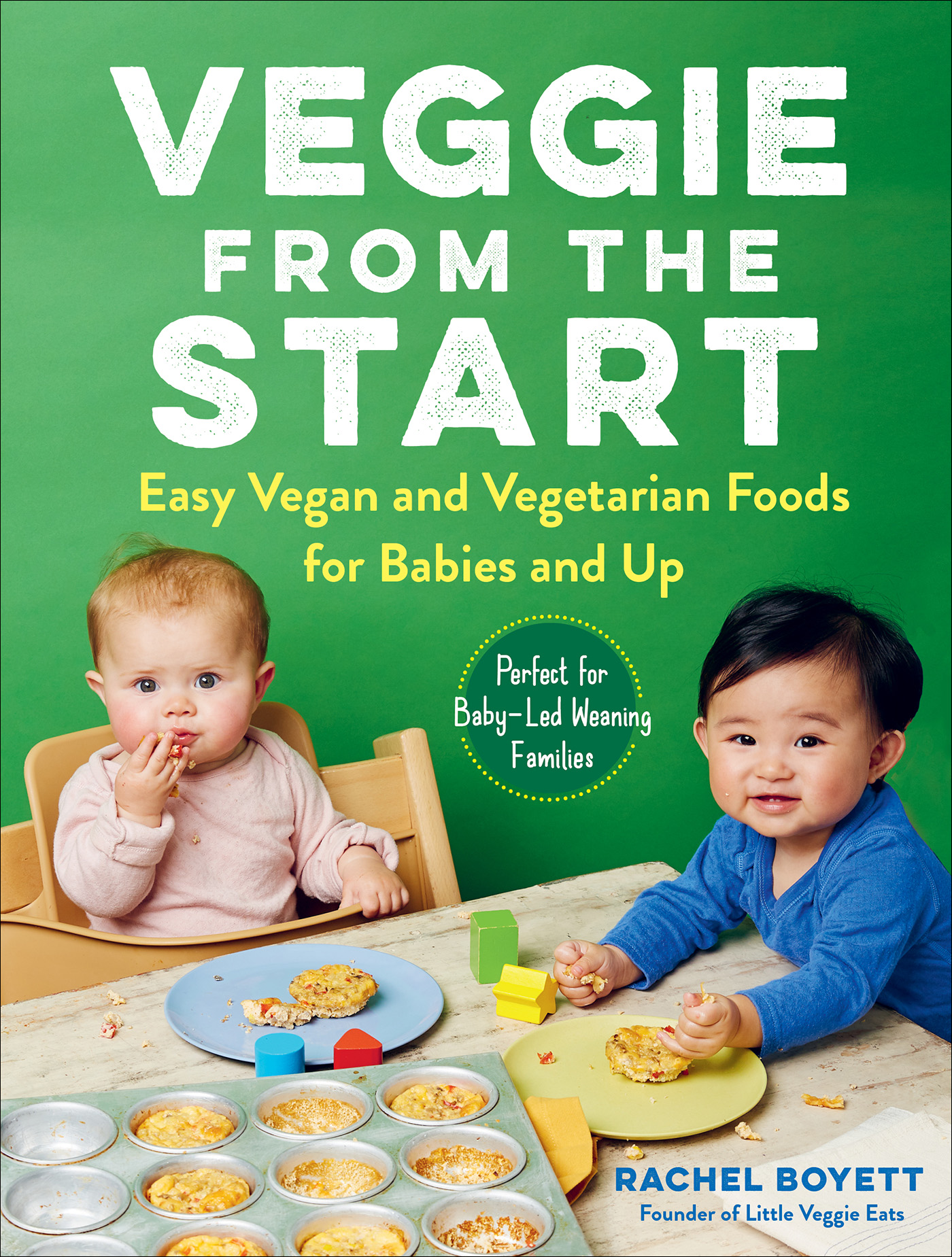


CONTENTS

Getting Started
About me
What should be the first foods that you give your children? And is it an extra problem if you are vegetarian or vegan?
In this book, I want to share my experiences of weaning children on vegetarian foods; the recipes are for meals and snacks that I prepared for my two older children. This is the book I wish Id had by my side at the time, especially when weaning for the first time!
I set up an Instagram account called Little Veggie Eats back in 2015 as a way of documenting my sons weaning journey. I had just emerged from the first 6 months of motherhood, which, like for many, passed in a blur. While I was enjoying being a mother I was finding many aspects of it pretty monotonouschanging, feeding, baby classes, sleeping (a bit!)... on repeat. I put off weaning until my son was exactly 6 months old, anticipating disruption to our carefully balanced routine, but also more monotony!
It turns out I was wrong to dread weaning!
It ended up being my favorite stage of parenting so far and it inadvertently ended up shaping a career change.
Ive always loved food and cooking. Several strong women in my family, my grandmother, sister, and aunt, set me up for a lifetime love of food. Yet during the new-baby haze Id become disconnected from the enjoyable side of cooking; I had less time to cook, I wasnt experimenting much, and I was fueling rather than enjoying food.
I made the decision quite early on that I wasnt going to offer traditional baby food to my children. I was interested in offering my son normal food that was suitable for the whole family but at the same time was baby-friendly. Weaning reconnected me with my enjoyment of cooking and family eating. I had my own human guinea pig to test new creations on and I relished cooking without sugar and salt, and finding ways to create food that was as nutrient-dense as possible.
My husband and I made the decision together to raise our children vegetarianit was a quick conversation shortly before our first child was born. Ive been a vegetarian my whole life and having never cooked meat it wasnt something I was prepared to start doing. I had a very healthy vegetarian childhood so I took it for granted that my son wouldnt need meat to be healthy.
But other people seemed to have a different opinion. Ive been told that it wasnt my place to make that decision and my son should decide to be vegetarian when older, if he wanted.
However, we looked at it from the other way around: Why shouldnt we make that decision now, and let him be free to decide otherwise when older? As parents we make hundreds of decisions that shape the way we raise our young children, from what books they read, what TV shows they watch (or if they watch TV at all), what clothes they wear, whether they follow a religion, and if you are meat-eaters, what meat they should eat, and so on.
Being responsible for the health of another (much more vulnerable!) human made me more aware of nutrition in my own diet. I started looking into what nutrients vegetarians need, the different plant-based sources of protein, iron, and calcium, and what foods are nutritionally better than others.
The recipes in this book are intended to be used from the very start of weaning, but with simple adaptations and ingredient tweaks they are for the whole family to enjoy, including older children and adults.
I wont pretend my children havent gone through fussy phases. They havent eaten nutritionally dense food for every single meal. But I have always tried to experiment and to introduce them to lots of new flavors and textures. I have never stopped offering them foods even if they might have rejected them, sometimes for months on end.
I strongly believe that as parents our job is to offer our children a varied diet.

We should do our best to ensure that what they are eating has a good nutritional spread and to be aware of what we are feeding them. And there is no more important time to start this than when your baby first starts eating solids. They might not be eating loads at this stage but they are always learning, always experiencing new things, and in particular, they are entering the world of food.
The recipes are simple, because with the best will in the world, when you have small children life is complicated enough without making cooking challenging, too! These are all recipes my family has enjoyed time and time again. Lots of variety, lots of color, and, above all, an emphasis on putting vegetables at the heart of the family table.
Vegetarian & plant-based diets
As someone who has been a vegetarian my whole life, I have seen attitudes and awareness change dramatically over the years.
When I was a child, being a vegetarian was something of an oddity. Not any more! I am overjoyed that a collective awakening seems to be happening. It makes eating out, shopping, and cooking much easier; there are more recipes, more ingredients, and more options than ever before!
Traditionally, someone who follows a vegetarian diet does not eat meat, fish, or chicken. If you are following a vegan or a plant-based diet, you also dont eat any animal products including milk, cheese, eggs, and honey. Although Im not vegan myself, lots of the recipes in this book are either vegan or easily adapted to be vegan. This is to do with a general shift in my household toward reducing animal products where possible, but also because while Ive been running Little Veggie Eats on Instagram I would often be asked to suggest alternatives for people whose babies had allergies to dairy or egg.
There seems to be a more fluid approach to labels based on what we eat now, and this is no bad thing. It is perfectly acceptable to eat a vegan diet Monday to Friday, or to be vegetarian at home but not when eating out, or just to be trying to eat less meat and dairy whenever you can. Some people think that the so-called flexitarian diet is very much the diet of the future. If it encourages people to reduce the animal products they eat, then it is a positive step.
You might be reading this book because you are new to vegetarianism or veganism and want to know how you can bring your child up with the same diet. Or you might just be committed to eating a little less meat and animal products and want your child to do the same. Whatever you do, and however youve labeled yourself, ultimately we all just want the best for our children and for them to grow up enjoying a healthy relationship with food.
Climate change & the future of food
Each generation is different from the previous one. Whatever our own food preferences and eating history, it seems a safe bet that our children will not be eating in the same way as we did as kids.
We are headed toward a climate disaster and scientists keep saying that dramatic changes to our global diet are needed. The key point is that we need to eat fewer animal products due to the environmental impact of intensive animal farming. That will mean increasing the amount of plant-based foods we eat. By starting your baby on a meat-reduced or meat-free diet, you are equipping them for the world in which they will have to live.


